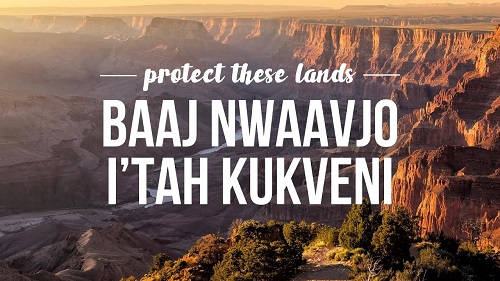The Grand Canyon Tribal Coalition announced a campaign calling on President Biden to establish the Baaj Nwaavjo I’tah Kukveni Grand Canyon National Monument using his executive authority under the Antiquities Act. Baaj Nwaavjo means “where tribes roam” to the Havasupai, and I’tah Kukveni means “our footprints” for the Hopi.
For more than a decade, tribal leaders have been fighting to protect the Grand Canyon region from uranium mining threats. The proposal for the Baaj Nwaavjo I’tah Kukveni Grand Canyon National Monument would include 1.1 million acres around and adjoining Grand Canyon National Park. These lands form an integral part of the Colorado River’s Grand Canyon watershed and are where traditional practices, cultural knowledge and spiritual ceremonies have taken place for millennia.
National monument designation would honor the Grand Canyon Tribal Coalition members’ deep cultural ties to the Grand Canyon and protect the area by making the temporary 20-year mining moratorium permanent while securing the cultural, natural, recreational and scientific resources of the region. Twelve Tribal Nations that have called Grand Canyon their home since time immemorial, are unified in their effort to continue the movement to protect their traditional homelands under the Antiquities Act.
Through the prevention of further uranium mining development and improved management of waters and forests, the Baaj Nwaavjo I’tah Kukveni Grand Canyon National Monument designation would have the capacity to increase climate resilience by safeguarding the waters of the Colorado River in the context of aridification, reducing wildfire severity, limiting groundwater loss and disruption associated with uranium mining activities, and protecting unique biodiversity including endangered California Condor and endemic and culturally important plants, from threats such as habitat loss and toxic pollution.
“Kahtoola stands firmly behind the Grand Canyon Tribal Coalition and their steadfast dedication to preserve, protect and steward the lands in and around the Grand Canyon area. As a local business that values indigenous heritage and perspectives, we support the tribal led coalition’s proposal to create this monument for the protection of the landscapes, waterways, wildlife, cultural values, clean water and respectful outdoor recreation. We strongly encourage the Biden administration to acknowledge the critical work of the Tribes, who are the original inhabitants and stewards of these lands through the President’s authority to designate Baaj Nwaavjo I’tah Kukveni Grand Canyon National Monument,” said Danny Giovale, founder and owner of Kahtoola.
The effort also is supported by Wild Arizona, a statewide organization working to protect, unite and restore wildlands and waters across Arizona.
“Wild Arizona offers deep thanks and our steadfast support to the Grand Canyon Tribal Coalition for their monumental effort to safeguard the Grand Canyon and its rimlands and acknowledges their many generations of stewardship and protection of the lands, waters and wildlife of this beloved region. The Baaj Nwaavjo I’tah Kukveni Grand Canyon National Monument proposal shows the vision of regional Tribal leaders for the health and beauty of this living cultural landscape and its vital ecosystems, sacred Tribal lands and waters, and sustaining economic benefits, set against the devastating impacts of uranium mining. Wild Arizona urgently requests the Biden Administration to swiftly advance their historic proposal and ensure that the Grand Canyon’s cultural connections and natural legacy be preserved and healed to honor all generations: past, present and future” said Kelly Burke, executive director of Wild Arizona.
The Grand Canyon Tribal Coalition consists of leadership representatives of the Havasupai Tribe, Hopi Tribe, Hualapai Tribe, Kaibab Paiute Tribe, Las Vegas Band of Paiute Tribe, Moapa Band of Paiutes, Paiute Indian Tribe of Utah, Navajo Nation, San Juan Southern Paiute Tribe, Yavapai-Apache Nation, Pueblo of Zuni, and the Colorado River Indian Tribes.








